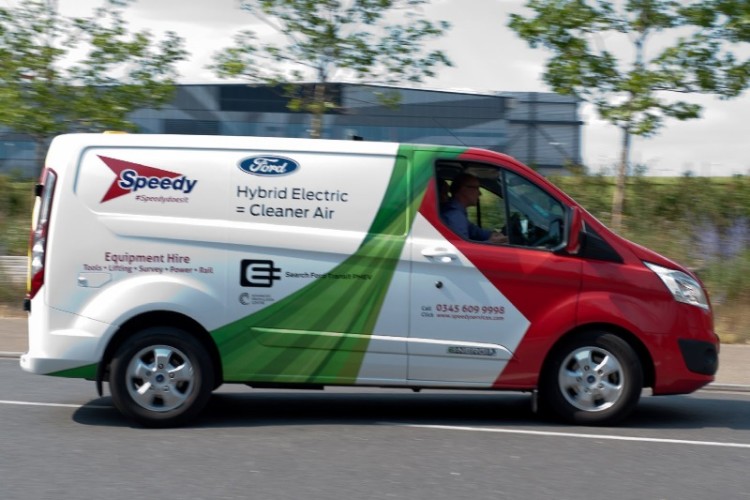Businesses including Heathrow Airport, Speedy Hire, Transport for London, Clancy Plant, Interserve, Mears Group and M Group Services took part in the 12-month study with new prototype Ford Transit vans.
The positive findings for the viability of plug-in hybrid electric (PHEV) commercial vehicles come three months after the introduction of London ultra-low emissions zone (ULEZ), which has helped create market interest in electric and hybrid vehicles, despite concerns about their operational range and capabilities.
The trial – which was supported by £4.7m grant from the UK government-funded Advanced Propulsion Centre – consisted of 20 Ford Transit Custom Plug-In Hybrid vans covering 240,000 km (150,000 miles) over a 12-month period. The trial sought to test whether businesses could carry out the typical daily duties of their diesel-powered vehicles, while maximising the use of zero-emissions electric-only mode.
The participants in the trial – which also included Addison Lee Group, Autoglass, British Gas, the Metropolitan Police, RNLI, Royal Mail, Vodafone and Sky – integrated the Ford Transit Custom Plug-In Hybrid vans into their day-to-day operations.
During the trial, 75% of the fleet’s mileage in Central London and 49% in Greater London was completed using pure electric power. The results highlight that even without a fully established electric vehicle charging network, the hybrid vans were able to dramatically reduce tailpipe emissions in the inner city, using the flexibility of a petrol range-extender to complete longer journeys when required.
Commercial vehicles in London make 280,000 journeys on a typical weekday, travelling a total of 13 million km (8 million miles). Vans represent 75% of peak freight traffic, with more than 7,000 vehicles per hour driving at peak times in Central London alone.
For Speedy Hire, exemption from London’s congestion zone saved it £1,288 in charges for 112 visits to the congestion charge zone. Its PHEV drove on 83% pure electric power on these occasions.
One Speedy delivery required a 402 km (250-mile) return trip, which included 122 km (76 miles) – more than 30% – driven on electric-only power. However, average daily mileage would not be ideal for a fully electric vehicle, it found.

Ford’s Mark Harvey, director of the Urban Electrified Van programme, said: “Emissions-free mobility is essential for the future of our cities and their citizens, but we know there are still barriers we face in the move to electrification. We also know that businesses still have legitimate concerns about the range of fully-electric vehicles, as well as their cost-effectiveness and reliability. These trials have helped Ford and its customers to investigate the extent to which PHEVs can help to achieve urban air quality goals, whilst not compromising on productivity.”
Ford has already incorporated learnings from the trial of prototype vehicles to optimise the Transit Custom Plug-In Hybrid production model that will go on sale to customers at the end of 2019. Enhancements include increased motor performance, optimised operating strategies, and revised displays to educate drivers in achieving maximum electric regeneration, it says.
Further trials in Cologne and Valencia will provide data from different markets, cities and customer types, and will involve a mix of Transit Custom Plug-In Hybrid vans and new Tourneo Custom Plug-In Hybrid people-movers. These two models are the first vehicles in their classes to offer plug-in hybrid technology, and offer a standard eight-year battery warranty.
The new vehicles target a zero-emission driving range of 50 km (31 miles), and use a 1.0-litre EcoBoost petrol engine as a range extender for total range exceeding 500 km (310 miles). A compact battery pack under the vehicle floor can be charged using a standard 230-volt supply, and is designed so that the interior space and load capacity of the vehicle is not compromised.
“This trial is the first time Ford has given such early prototype vehicles to customers, and we’ve been able to incorporate their feedback directly into the production van,” Mark Harvey said. “The response has been overwhelmingly positive – operators don’t want to give them back.”
Speedy’s head of transport and logistics, Mark Woolworth, said: “Our vehicle fleet is the lifeblood of our business, ensuring we’re able to get tools and equipment to our customer’s sites on time. In London, where we provide critical support to hundreds of projects, our Capital Commitment initiative means we’ll deliver our top 52 products within four hours of them being ordered.
“But, alongside this commitment to customer service excellence is another to make our business more sustainable. We’re targeting a big reduction in our carbon output over the next five years. Using the latest in clean vehicle technology, like the Transit Custom plug-in hybrid van, this means we can deliver both for our customers and on our commitment to the environment.”
Ford recently announced that a new all-electric Ford Transit will join the company’s European line-up of electrified commercial vehicles in 2021.
Got a story? Email news@theconstructionindex.co.uk



